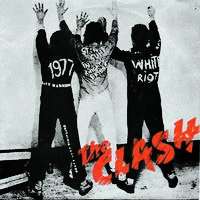White Riot
| "White Riot" | ||||
|---|---|---|---|---|
 | ||||
| Single by The Clash | ||||
| from the album The Clash | ||||
| B-side | "1977" | |||
| Released | 18 March 1977 | |||
| Format | 7" vinyl | |||
| Recorded | February 1977 | |||
| Genre | Punk rock | |||
| Length | 1:58 | |||
| Label | CBS CBS 5058 | |||
| Writer(s) | Joe Strummer/Mick Jones | |||
| Producer(s) | Micky Foote | |||
| The Clash singles chronology | ||||
| ||||
"White Riot" is a song by English punk rock band The Clash, released as the band's first single in 1977 and also featured on their debut album. There are two versions: the single version (also appearing on the US version of the album released in 1979), and a different version on the UK album. According to their respective label copy the single version is 1:58 in running time while the UK album version is 1:55.
Inspiration and composition
The song is short and intense, in the typical punk style of three chords played very fast. Mick Jones counts off "1-2-3-4" at the start of the album version while the single version begins with the sound of a police siren instead.
Lyrically, the song is about class economics and race and thus proved controversial: some people thought it was advocating a kind of race war.[1] Rather, lyricist Joe Strummer was trying to appeal to white youths to find a worthy cause to riot, as he felt black people in the UK already had. It contains a positive message in the lines "Are you taking over / Or are you taking orders? / Are you going backwards / Or are you going forwards?"
The song was written after Joe Strummer and bassist Paul Simonon were involved in the riots at the Notting Hill Carnival of 1976.[1]
Reception
The only person who played ‘White Riot’ on the radio was John Peel — and he's gone on holiday. You play our record against any of the other stuff and it just knocks spots off them left, right and centre. They must be cunts for not playing it.
"White Riot" is considered a classic in The Clash canon, although as the band matured, Mick Jones would at times refuse to play it, considering it crude and musically inept. Over two decades later, Joe Strummer would perform it with his band the Mescaleros. The B-side of the single was "1977", a non-album track. This song was along similar lines to "White Riot", suggesting that the music of Elvis Presley, The Beatles, and The Rolling Stones was no longer relevant.
In March 2005, Q magazine placed "White Riot" at number 34 in its list of the 100 Greatest Guitar Tracks.
The song was featured in the soundtrack for the game Tony Hawk's Underground. It is played when Swansea City emerge at the Liberty Stadium.
Personnel
"White Riot"
- Joe Strummer - lead vocal, rhythm guitar
- Mick Jones - lead guitar, backing vocal
- Paul Simonon - bass guitar, backing vocal
- Terry Chimes - drums
"1977"
- Joe Strummer - lead vocal, backing vocal, lead guitar
- Mick Jones - backing vocal, lead guitars
- Paul Simonon - bass guitar, backing vocal
- Terry Chimes - drums
Cover versions
 |
|
| Problems playing this file? See media help. | |
The song was quickly covered by Clash contemporaries Sham 69. The punk rock/Oi! band Cock Sparrer also did a live cover version of the song, which even appeared on their "The Best of Cock Sparrer" and "England Belongs to Me" albums. The Mekons' first single, "Never Been in a Riot" was a response to "White Riot."
The song has been covered by, among others, hip-hop/punk rock band The Transplants, rock/folk/carnival band Camper Van Beethoven, punk rock band Anti-Flag, Cracker, alternative rock band Audioslave, and the Angelic Upstarts. The American Celtic punk band Dropkick Murphys have covered the song live, one recording of which is on their The Singles Collection: Volume One album. It was also performed by Rage Against The Machine at their free concert in Finsbury Park and Download Festival in June, 2010.
The song has also been covered in a folk-rock style by The Bad Shepherds on their album "By Hook or by Crook".
Punk Rock band Rise Against covered the song during their shows at the Reading and Leeds Festivals in 2011 after vocalist Tim McIlrath made a speech about the London Riots of 2011.
Charts
|
Notes
- 1 2 Letts Don. (2001). The Clash: Westway to the World. Event occurs at 25:45–27:40.
- ↑ Coon 1977.
References
- Coon, Caroline (1977). 1988: The New Wave Punk Rock Explosion. London: Hawthorn. ISBN 0-8015-6129-9. OCLC 79262599. Retrieved 2011-09-19.
- Gilbert, Pat (2005) [2004]. Passion Is a Fashion: The Real Story of The Clash (4th ed.). London: Aurum Press. ISBN 1-84513-113-4. OCLC 61177239.
- Gray, Marcus (2005) [1995]. The Clash: Return of the Last Gang in Town (5th revised ed.). London: Helter Skelter. ISBN 1-905139-10-1. OCLC 60668626.
- Green, Johnny; Garry Barker (2003) [1997]. A Riot of Our Own: Night and Day with The Clash (3rd ed.). London: Orion. ISBN 0-7528-5843-2. OCLC 52990890.
- Gruen, Bob; Chris Salewicz (2004) [2001]. The Clash (3rd ed.). London: Omnibus. ISBN 1-903399-34-3. OCLC 69241279.
- Letts Don; Joe Strummer, Mick Jones, Paul Simonon, Topper Headon, Terry Chimes, Rick Elgood, The Clash (2001). The Clash: Westway to the World (Documentary). New York, NY: Sony Music Entertainment; Dorismo; Uptown Films. Event occurs at 25:45–27:40. ISBN 0-7389-0082-6. OCLC 49798077.
- Needs, Kris (2005-01-25). Joe Strummer and the Legend of the Clash. London: Plexus. ISBN 0-85965-348-X. OCLC 53155325.
- Topping, Keith (2004) [2003]. The Complete Clash (2nd ed.). Richmond: Reynolds & Hearn. ISBN 1-903111-70-6. OCLC 63129186.